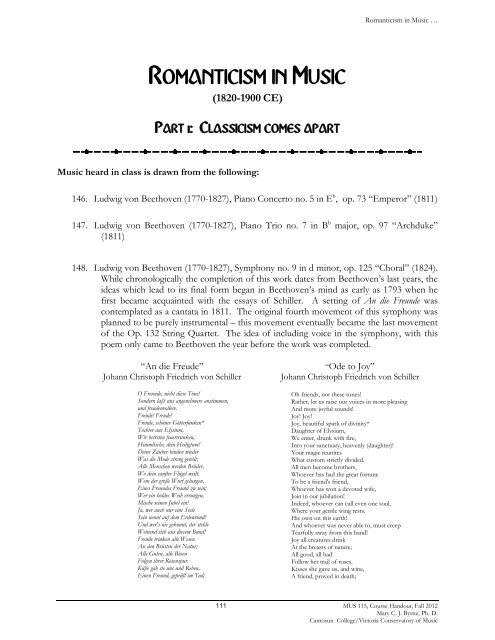Survey of Western Music (MUS 115) - Mary Byrne
Survey of Western Music (MUS 115) - Mary Byrne
Survey of Western Music (MUS 115) - Mary Byrne
You also want an ePaper? Increase the reach of your titles
YUMPU automatically turns print PDFs into web optimized ePapers that Google loves.
ROMANTICISM IN <strong>MUS</strong>IC<br />
(1820-1900 CE)<br />
PART 1: CLASSICISM COMES APART<br />
<strong>Music</strong> heard in class is drawn from the following:<br />
Romanticism in <strong>Music</strong> …<br />
146. Ludwig von Beethoven (1770-1827), Piano Concerto no. 5 in E b , op. 73 “Emperor” (1811)<br />
147. Ludwig von Beethoven (1770-1827), Piano Trio no. 7 in B b major, op. 97 “Archduke”<br />
(1811)<br />
148. Ludwig von Beethoven (1770-1827), Symphony no. 9 in d minor, op. 125 “Choral” (1824).<br />
While chronologically the completion <strong>of</strong> this work dates from Beethoven’s last years, the<br />
ideas which lead to its final form began in Beethoven’s mind as early as 1793 when he<br />
first became acquainted with the essays <strong>of</strong> Schiller. A setting <strong>of</strong> An die Freunde was<br />
contemplated as a cantata in 1811. The original fourth movement <strong>of</strong> this symphony was<br />
planned to be purely instrumental – this movement eventually became the last movement<br />
<strong>of</strong> the Op. 132 String Quartet. The idea <strong>of</strong> including voice in the symphony, with this<br />
poem only came to Beethoven the year before the work was completed.<br />
“An die Freude”<br />
Johann Christoph Friedrich von Schiller<br />
O Freunde, nicht diese Töne!<br />
Sondern laßt uns angenehmere anstimmen,<br />
und freudenvollere.<br />
Freude! Freude!<br />
Freude, schöner Götterfunken*<br />
Tochter aus Elysium,<br />
Wir betreten feuertrunken,<br />
Himmlische, dein Heiligtum!<br />
Deine Zauber binden wieder<br />
Was die Mode streng geteilt;<br />
Alle Menschen werden Brüder,<br />
Wo dein sanfter Flügel weilt.<br />
Wem der große Wurf gelungen,<br />
Eines Freundes Freund zu sein;<br />
Wer ein holdes Weib errungen,<br />
Mische seinen Jubel ein!<br />
Ja, wer auch nur eine Seele<br />
Sein nennt auf dem Erdenrund!<br />
Und wer's nie gekonnt, der stehle<br />
Weinend sich aus diesem Bund!<br />
Freude trinken alle Wesen<br />
An den Brüsten der Natur;<br />
Alle Guten, alle Bösen<br />
Folgen ihrer Rosenspur.<br />
Küße gab sie uns und Reben,<br />
Einen Freund, geprüft im Tod;<br />
“Ode to Joy”<br />
Johann Christoph Friedrich von Schiller<br />
Oh friends, not these tones!<br />
Rather, let us raise our voices in more pleasing<br />
And more joyful sounds!<br />
Joy! Joy!<br />
Joy, beautiful spark <strong>of</strong> divinity*<br />
Daughter <strong>of</strong> Elysium,<br />
We enter, drunk with fire,<br />
Into your sanctuary, heavenly (daughter)!<br />
Your magic reunites<br />
What custom strictly divided.<br />
All men become brothers,<br />
Whoever has had the great fortune<br />
To be a friend's friend,<br />
Whoever has won a devoted wife,<br />
Join in our jubilation!<br />
Indeed, whoever can call even one soul,<br />
Where your gentle wing rests.<br />
His own on this earth!<br />
And whoever was never able to, must creep<br />
Tearfully away from this band!<br />
Joy all creatures drink<br />
At the breasts <strong>of</strong> nature;<br />
All good, all bad<br />
Follow her trail <strong>of</strong> roses.<br />
Kisses she gave us, and wine,<br />
A friend, proved in death;<br />
111 <strong>MUS</strong> <strong>115</strong>, Course Handout, Fall 2012<br />
<strong>Mary</strong> C. J. <strong>Byrne</strong>, Ph. D.<br />
Camosun College/Victoria Conservatory <strong>of</strong> <strong>Music</strong>



